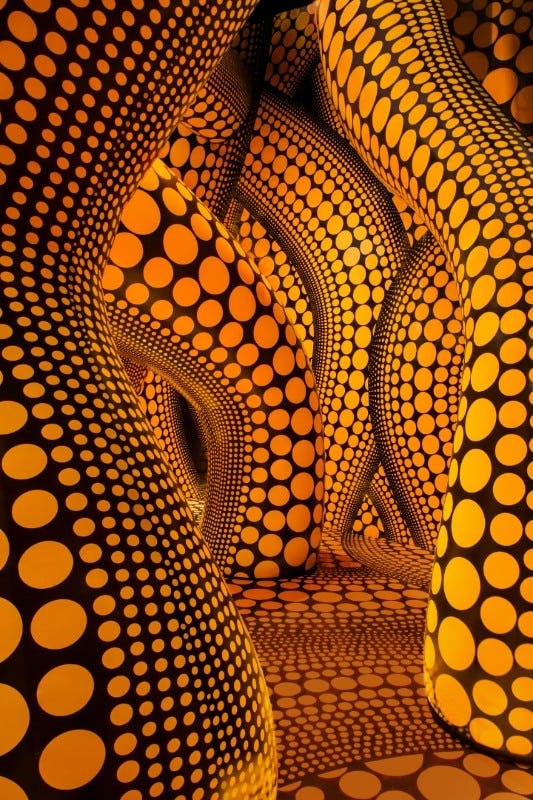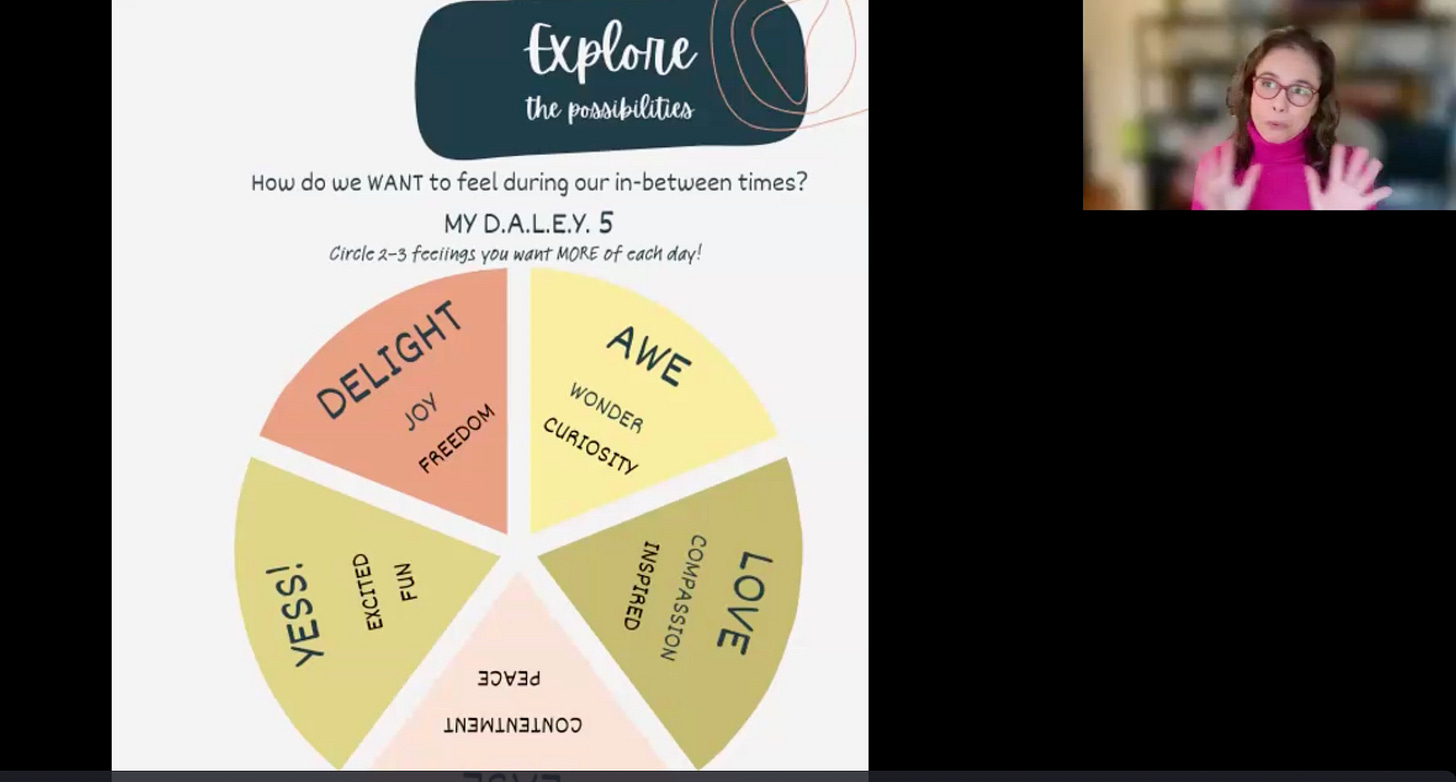How Polka Dots Became the Ozempic I Needed to Walk Through Grief
An Update on Experiment #9
A heartfelt thank you to everyone who responded to last week’s Running Slow AF post. I felt a bit vulnerable opening up about my sometimes dysfunctionally perfectionistic relationship with exercise. The slow running is going great so far! (By which I mean I’m feeling exactly how I want to feel in my body, without constantly thinking I need to be doing more, more, more! 🙌🏼 )
The WONDER✨SHOP last week was so fun and inspiring! Scroll to the end of this post for a link to watch if you missed it. We’ll be having another one soon. More details next week!
This week’s post is an update on this month’s experiment to experience more AWE in my life. If you want to catch up on how it started, START HERE:
There are hundreds of drugs that start out as a treatment for one condition, then accidentally prove effective in treating something entirely different.
Sometimes these drugs become even more prevalent and well-known for treating the secondary condition than the first! Ozempic, anyone?
This is one of the coolest aspects of science to me, how pursuing one scientific question can unravel a whole a path of discovery you never could have imagined at the outset.
My monthly experiments have felt a bit like this. I often start out addressing one challenge, and then, as I work with it over the month, I uncover new questions and angles I’d never thought of. This month has been no different.
The Experiment
At the beginning of the month I brought together three disparate concepts into one experiment: waiting, awe, and polka dots. The question at hand:
Could I squeeze more awe into my days by zooming out during the waiting times of life?
If I used my waiting times to imagine (as inspired by the artwork of Yuyoi Kusama), myself and my fellow humans as dots , pulsing together on this larger dot called planet earth, in this dot called a solar system, and so on, might I be able to lean on awe in those moments to release some of the daily irritations and anxieties of daily life?
The Results
I definitely had some cool moments of awe in the weeks following the experiment launch.
Once, while in a stream of traffic inching down the highway, I envisioned the dot of my car swarming north along with the dots of fellow drivers in their cars, all of us weaving and criss-crossing across the dot that is this country, on the dot that is this continent.
As I pictured this, I was lifted out of the egocentric trance that my life need be all about me/mine. I felt the tingling awareness of the vastness of this world, and wonder at the immensity and variety of life on this planet.
Then, this week I was invited to a luncheon where two Israeli survivors of the terrorist attacks of October 7th were invited to speak.
The stories they shared are precisely the stories you’d imagine if a dad you knew spent 20 hours holed up in a bedroom with his family and a cellphone, trying desperately to keep his kids, his siblings, and his parents safe in chaotic and violent conditions.
While terrorists walked in their kitchens, their children hid under bunk beds, trying not to make a sound. The men described holding the knob of one side of an unlocked door tightly while terrorists tried desperately to turn it from the other side. Grip against grip, a matter of life and death.
My throat tightened and my heart tore as one of the dads spoke of texting with his two sons, who’d spent the previous night with another family on a sleepover. We’re scared, come get us, the sons begged again and again over text as screams and havoc unfolded in their neighborhood streets.
In the end, these men escaped with their kids, their immediate families intact. But many of their friends and neighbors, and two of their own parents, didn’t make it. One disabled sister almost died from smoke inhalation when terrorists placed a burning tire in her home.
The stories I heard that day weighed heavily on me as I made my way home. I thought of the thousands of stories I hadn’t yet heard, unfathomable losses in a terrible war.
I didn’t want to escape my grief. It’s a gift to be able to witness and experience empathy for others. But I had an urge do something with all of the sadness that was coming up. To try to make sense of it, or maybe somehow transmute it into something more tangible.
That’s when I remembered the polka dots.
As I steered my van onto the Bay Bridge, I pictured the families of Kibbutz Be’eri, extracted from their homes and their lives, sitting on hotel beds near the Dead Sea, wondering what’s next. I pictured scores of families huddled in plastic tents in Rafah, longing for food, water, safety. I pictured soldiers and doctors, teachers and toddlers, each their own dot of precious life, pulsing with hopes and sorrows, fears and love, up and down a narrow strip of land that hugs the Mediterranean Sea.
Then, I sensed my own polka dot-ness, here in California, on the other side of the world. I began to zoom up and out in order to see all the dots, the millions of lives, between here and there.
I felt awe, but there was another feeling mixed in, too. A sense of connection, a tinge of admiration for so many beings fighting so hard to hold onto what’s most precious.
That’s when I realized. No dot stands alone. Each dot melts into a bigger universe of dots. Infinity stretches into infinity until we’re all one.
When I began this experiment, I thought it would give me something positive to put my mind on when I was grumpily stuck waiting in line at the pharmacy or on hold with the insurance company. I never imagined I’d be driving in my car conjuring very specific dots of lives halfway across the world, experiencing connection with humans in cultures and circumstances vastly different from my own.
In Dacher Keltner’s book, Awe: The New Science of Everyday Wonder and How It Can Transform Your Life, he discusses an international study of the stories people tell when asked about awe. It turns out that the events that most inspire awe in people across the world aren’t religious epiphanies or mountaintop vistas.
The thing that most inspires awe in human beings is witnessing other people: their capacity for kindness, or strength, or ability to overcome challenging circumstances.
Awe is out there waiting for us. It may be out on that hiking path in the forest or by that beach you love. But it’s just as likely to be found in a neighbor’s generous offer to go above and beyond to help you out, or in a story about first-responders on the news, or in witnessing your dad’s courage and grace as he faces debilitating disease.
I know we’re all sick watching the hate and the divisiveness roiling this messed up world.
I invite you, friend, to look around and find some medicine in the wonder that surrounds you today.
I’d like to think it just might be possible to awe ourselves back into healing this beautiful, broken world.
Did you find this experiment intriguing? Do you want to create your own?
Here’s the recording of this week’s WONDER✨SHOP! It’s a 15-minute odyssey…
✨ away from achievement-chasing and postponing our lives for external validation
✨ to harnessing our imaginations to fuel delight, love, peace and enthusiasm!






Such a beautiful, thoughtful reflection.